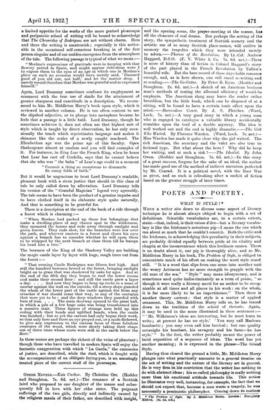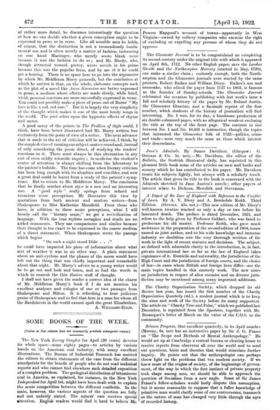POETS AND POETRY.
WHAT IS STYLE ? *
WHEN a writer sits down to discuss some aspect of literary technique he is almost always obliged to begin with a set of definitions. Scientific vocabularies are, to a certain extent, static—that, indeed, is their raison d'etre—but a literary vocabu- lary is like the Irishman's notorious pig—I mean the one which ran about so much that he couldn't count it. Both the critic and the Irishman, in acknowledging this peculiarity in their subjects, are probably divided equally between pride at its vitality and chagrin at the inconvenience which this liveliness causes. There is no doubt about it, our pig is thoroughly alive, and so Mr. Middleton Murry in his book, The Problem of Style, is obliged to concentrate much of his effort on making the word style stand still. " It is a word that slips from one sense into another unti the weary Aristaeus has no more strength to grapple with the old man of the sea." " Style " may mean idiosyncrasy, and is sometimes used quite indiscriminately as a term of praise, " as though it were really a literary merit for an author to be recog- nizable at all times and all places in his work : on the whole, it is far more likely to be an impertinence." Then there is another theory current : that style is a matter of applied ornament. This, Mr. Middleton Murry tells us, he has traced down to the tradition of the school of rhetoric. Again, it may be used in the sense illustrated in these sentences :— " ' Mr. Wilkinson's ideas are interesting, but he must learn to write ; at present he has no style.' You may call Marlowe bombastic ; you may even call him farcical ; but one quality outweighs his bombast, his savagery and his fame—he has style.' " In the first, the writer probably meant the power of lucid exposition of a sequence of ideas. The word has yet another meaning ; it is expressed in, the phrase—The Grand Style.
Having thus cleared the ground a little, Mr. Middleton Murry plunges into what practically amounts to a general treatise on the sot of writing and the nature of the literary art in generaL He is very frau in his conviction that the writer has nothing to do with -abstract ideas ; his so-called philosophy is really nothing more than his emotional attitude towards life. This notion he ffinstrates very well, instancing, for example, the fact that we should not expect that, because a man wrote a tragedy, he was necessarily a pessimistic philosopher. Coming down to matters * The Problem of Style. By J. Middleton lam. londisr: Humping/ Matsui. [Se. 61 net..4
of rather more detail, he discusses interestingly the question of how we can decide whether a given conception ought to be expressed in prose or in verse. Like all sensible men he holds, of course, that the distinction is not a tremendously funda- mental one and is often merely a matter of fashion, instancing on one hand Massinger, who merely wrote blank verse because it was the fashion to do so ; and Mr. Hardy, who, though attracted toward poetry, wrote novels in his prime because this was the popular form, and by use of it he could get a hearing. There is no space here to go into the arguments by which Mr. Middleton Murry proceeds, but the conclusion at which he arrives is that, on the whole, elaborate concepts such as the plot of a novel like Anna Karanina are better expressed in prose, a medium whose effects are made slowly, while brief, vivid, personal reactions arc more successfully expressed in verse. You could not possibly make a piece of prose out of Burns' " My love is like a red, red rose." But it is largely the very simplicity of the thought which makes it one of the most lovely songs in the world. The poet relies upon the hypnotic effects of rhyme and metre.
A good many of the points in The Problem of Style could, I think, have been better illustrated had Mr. Murry written less exclusively from the point of view of a writer. The next advance that is made in the art of criticism will be achieved, I think, by the simple device of turning our subject-matter round and, instead of only considering the poem direct, of studying the readers' reactions to it. There must always be this alternation in any sort of even mildly scientific inquiry ; in medicine the student's centre of attention is always shifting from the laboratory to the patient's bedside. The time has come when literary criticism has been long enough with its alembics and crucibles, and now a great deal could be learnt from a study of the patient's symp- toms. But to return to Mr. Middleton Murry. The conclusion that he finally reaches about sty.e is a new and an interesting one. A " good style " really springs from refined and tenacious - sense perceptions. He illustrates this view by quotations from both ancient and modern writers—from Shakespeare to Misi Katherine Mansfield. From those who have, in addition to these acute perceptions, what I will loosely call the " literary sense," we get a revivification of language. With the true stylists metaphor and simile are no added ornaments. They use comparisons and similes because their thought is too exact to be expressed in the coarse medium of a direct statement. When Shakespeare wrote the passage which begins " On such a night stood Dido . . ."
he could have imparted his piece of information about what sort of weather it was in no other way. A plain statement about an anti-cyclone and the phases of the moon would have left out the thing that was chiefly important and remarkable about that night. Mr. Murry's advice to a young writer would be to go out and look and listen, and so find the words in which to enmesh the thin illusive stuff of thought.
I shall not have given the reader a correct idea of the charm of Mr. Middleton Murry's book if I do not mention his excellent analyses and eulogies of one or two passages from Shakespeare and Milton. It is refreshing to hear judicious praise of Shakespeare and to feel that here is a man for whom all the Bardolaters in the world cannot spoil the great Elizabethan.
A. WriJoAms-Euss.



































 Previous page
Previous page